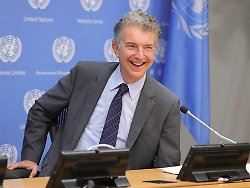Monday, December 6th, 2021
Change in Munich
Heusgen becomes head of the security conference
Wolfgang Ischinger is handing over the leadership of the top-class international Munich Security Conference. From February 2022, Chancellor Merkel’s long-time security advisor, Christoph Heusgen, will take over the post. But Ischinger does not want to withdraw completely.
Wolfgang Ischinger wants to hand over the leadership of the Munich Security Conference (MSC). “Now it is time to hand over operational management to younger hands,” Ischinger told the “Handelsblatt”. Therefore, he proposed to the board of trustees of the conference to entrust Christoph Heusgen with the chairmanship of the Munich Security Conference. The change should therefore take place after the next security conference, which is planned for February 2022.
According to its own information, Ischinger does not want to withdraw completely. “I myself will remain chairman of the board of trustees,” he announced. The 75-year-old former diplomat drew a positive balance of his work so far: “I have been leading the Munich Security Conference since 2008. In these 13 years I have been able to achieve and shape a lot with my team.”
Ischinger described the way to his decision to change the baton as follows in the “Handelsblatt”: “My wife said some time ago that I should stop before someone writes.” He asked her when that would happen. His wife then replied: “soon”. High-ranking government representatives from numerous countries regularly take part in the Munich Security Conference. It is considered to be one of the most important foreign and security policy forums worldwide.
Coalition agreement no challenge to Beijing
With a view to the current Russian troop deployment on the borders with Ukraine, Ischinger advised the new German government to adopt a policy of strength. However, he does not “yet” anticipate a Russian invasion of the neighboring country. Other important issues he mentioned were the relationship with China and “preventing a new Trump from coming to power in the United States”.
With a view to China, Ischinger expressed the expectation that German foreign policy would not change fundamentally here even under the new government. “In my view, the coalition agreement is not a declaration of war on Beijing, and Olaf Scholz cannot and will not seek a break with China,” he told the “Handelsblatt”.
Ischinger was a permanent state secretary in the Federal Foreign Office from 1998 to 2001 under the then head of department Joschka Fischer. Afterwards he was first German ambassador to the USA, then from 2006 to Great Britain. From 2005, Heusgen was responsible for foreign policy in the Chancellery for Chancellor Angela Merkel, who had just taken office. In 2017 he became permanent representative of Germany to the United Nations.
